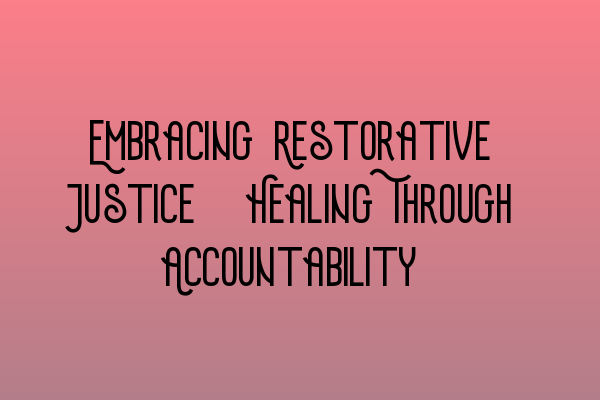Embracing Restorative Justice: Healing Through Accountability
Restorative justice is an alternative approach to dealing with criminal offenses that focuses on healing and repairing the harm caused rather than simply punishing the offender. It encourages accountability, empathy, and meaningful dialogue between all parties involved – the victim, the offender, and the community.
The Principles of Restorative Justice
Restorative justice is guided by several key principles:
- Accountability: Offenders are encouraged to take responsibility for their actions and understand the harm caused.
- Victim-centered: The needs and concerns of the victim are prioritized to promote healing and closure.
- Community involvement: The community plays an active role in the restorative justice process, fostering social cohesion and support.
- Empathy and understanding: Dialogue between the victim and the offender facilitates empathy and a deeper understanding of the impact of the crime.
- Rehabilitation: Restorative justice aims to address the underlying causes of offending behavior, reducing the likelihood of reoffending.
By embracing restorative justice, the criminal justice system can move away from a punitive mindset and towards a more holistic and healing approach.
The Benefits of Restorative Justice
Restorative justice offers numerous benefits over traditional punitive approaches, both for individuals and communities. Let’s explore some of these benefits:
Healing and Closure
For victims, restorative justice provides a unique opportunity to express their feelings, ask questions, and receive answers directly from the offender. This process can help victims find closure, regain a sense of control, and begin their healing journey.
Accountability and Responsibility
Restorative justice holds offenders accountable for their actions in a more meaningful way. By facing the consequences of their behavior, offenders have a chance to reflect, take responsibility, and make amends to the victim and the community.
Reduced Recidivism
Studies have shown that restorative justice programs have the potential to reduce recidivism rates. By addressing the underlying causes of offending behavior and promoting rehabilitation, offenders are less likely to reoffend in the future.
Community Engagement
Restorative justice strengthens community bonds by involving community members in the resolution process. By actively participating and supporting the healing of victims and offenders, community members foster a sense of belonging and unity.
Embracing Restorative Justice in UK Criminal Law
As legal professionals, it is essential to stay informed and updated on alternative approaches to criminal justice, such as restorative justice. Workshops and seminars on criminal practice can provide valuable insights and knowledge in this field. Check out Workshops and Seminars on Criminal Practice: Expanding Your Expertise to explore your learning opportunities.
Stay up-to-date with the latest developments and changes in UK criminal laws to effectively navigate the legal landscape. Read Updates in UK Criminal Laws: Staying Informed and Prepared for comprehensive information on recent updates.
If you’re preparing for the SQE Criminal Practice exam, consider utilizing mock tests to simulate exam conditions and enhance your chances of success. Find out more about Mock Tests for SQE Criminal Practice: Exam Simulation for Success.
Joining a study group can greatly enhance your SQE Criminal Law learning experience. Discover strategies to maximize your study group’s effectiveness in Enhancing Your SQE Criminal Law Study Group Experience.
To navigate the complexities of criminal evidence rules, it is crucial to have a detailed understanding. Dive deep into the subject with Decoding Criminal Evidence Rules: A Detailed Analysis.
By embracing restorative justice, legal professionals can contribute to a more compassionate and effective criminal justice system while ensuring accountability and healing for all individuals involved.
Embrace the power of restorative justice and its transformative potential. Let us work together towards a future where healing and accountability go hand in hand.
